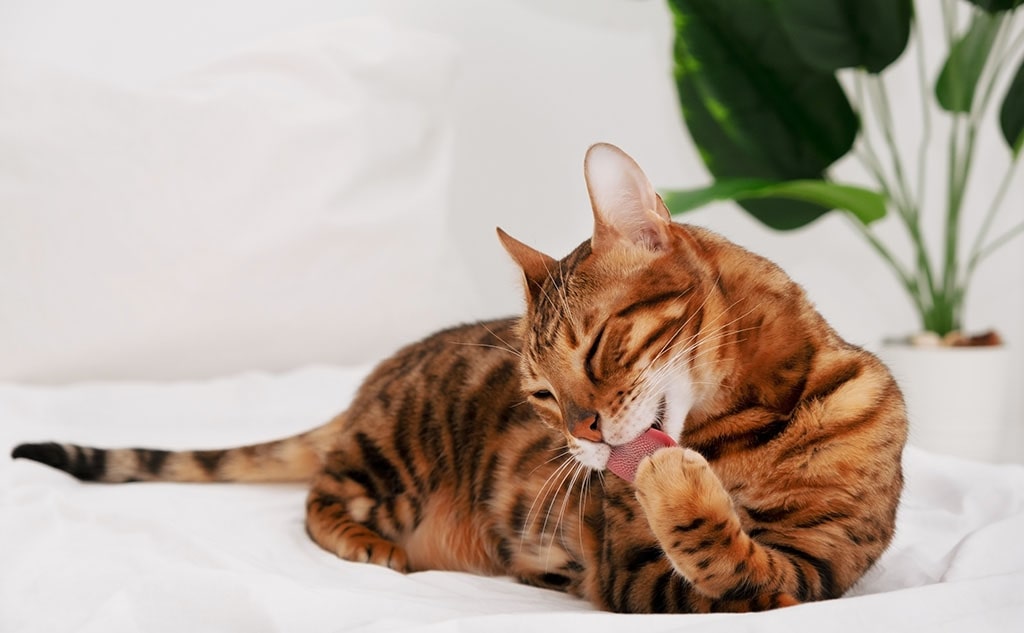
Cats are known for their soft, fluffy coats and affectionate personalities. But did you know that your cat’s skin can also be prone to dryness, flaking, and irritation? If this sounds familiar, it might be time for a checkup with your veterinarian. A cat’s skin is essentially just another organ in its body—just like any other organ needs proper care, so does its outer layer.
Why does the cat itch?
If your cat is itching, there’s a chance that they have dry skin. Several factors, including allergies and parasites, can cause dry skin. These conditions are common in cats fed dry food or those with an underlying health condition such as diabetes or kidney disease.
If the itching persists despite treatment for these issues, it might signify that your cat has developed an allergy to their food (or another ingredient). You may also notice scratch marks on furniture where they like to sleep and around other areas where you’ve seen more frequent scratching behavior, such as behind their ears or along their back legs (which wouldn’t be unusual if they had been licking themselves excessively).
What causes dryness and itchiness in cats?
If your cat has dry skin, flaking, and itching, it could be due to several reasons. Here are some common causes:
Weather and Temperature Changes
Your cat is probably most sensitive to temperature changes, so protecting it from the elements is essential. In hot weather, avoid exposing them to direct sunlight (or any sudden temperature change) while indoors.
If you’re traveling with your pet by car or plane and find yourself unable to control the temperature settings inside his, make sure that he has plenty of fresh water available so that dehydration won’t become an issue over time.
Over-grooming
Over-grooming is a common problem, and it can lead to a host of health issues.
- Cats are susceptible, so over-grooming may lead to infection. If your cat has sores or bald patches resulting from this problem, you should immediately take them in for a checkup with the vet.
- Over-grooming can also cause hair loss and irritation on the skin’s surface—which is why many cats scratch themselves until they bleed! A visit from the groomer may be necessary if this becomes an issue for your pet (and not just because you might want him to look good).
Cat food
It’s essential to ensure that the food you’re feeding your cat is high quality and free from harmful ingredients. If a pet store has a wide variety of cat foods on display, look at the ingredients listed on each one. You’ll want to avoid artificial coloring, preservatives, or sweeteners (like corn syrup).
It’s also worth checking out how much protein each brand contains—the higher the amount, the better! A diet rich in lean meats can help keep your cat’s coat healthy and assist with digestion problems such as hairballs or flatulence issues caused by overeating processed food.
Parasites in a cat
The first thing to know is that parasites can cause dryness, flaking, and irritation. These include fleas, ticks, lice, and ringworm, to name a few. If your cat has any of these problems, you should get him checked by a vet as soon as possible. You should also check for ear mites if your cat’s ears are red or wet with discharge – this could mean an ear infection caused by mites!
Cat food additives
Avoiding food additives is the first step to maintaining healthy skin. Food additives can be toxic to your cat and lead to allergies, digestive problems, and cancer. They also make it difficult for their bodies to absorb nutrients from their food.
Food coloring is another ingredient that shouldn’t be in cat food—it’s unnecessary! Cats don’t need bright colors on their dinner table: white meat, chicken, or salmon are great options. Avoiding preservatives will also help keep your kitty’s skin healthy by eliminating chemical buildup on the surface of his coat (and inside).
Food intolerance
If you suspect your cat has a food intolerance, the first step is to consult your veterinarian. The vet can tell you whether it’s safe for them to eat certain foods and, if so, what kinds of foods should be avoided or substituted.
If there is no response from the vet, it’s probably time for some investigation! Cats are very sensitive creatures—a simple change in their diet can cause severe issues like skin irritation or even anemia (low red blood cell count).
Skin diseases in a cat
Skin diseases in cats are a common occurrence and can be caused by parasites, allergies, or skin conditions. Cats with skin diseases may have hair loss, redness, scaling, and flaking on the body and face. Cats with skin diseases may also have a foul smell to their fur.
Skin disorders in cats can be treated with topical medications from your veterinarian or at home using natural remedies such as coconut oil.
How do you know if your cat has dry skin?
If your cat has dry skin, you should look for redness, flaking, scaling, and itching. You may also notice scratching or sores on the skin. If you have a feline friend that suffers from dry skin, it is essential to take note of any changes in their health over time. A sudden behavior change can indicate a more severe problem, such as fleas or allergies. Still, it could also indicate something less serious, like allergies or an infection related to flea bites or other environmental factors, such as flea dirt (flea dirt is very common in our homes).
Taking care of your cat at home
Cats have a lot of skin on their bodies, so it’s essential to make sure you’re giving them the best treatment possible. Here are some tips on how to take care of your cat’s skin at home:
- Feed your cat a high-quality diet. Cats must eat a balanced diet with protein and vitamins to keep their fur healthy and shiny. You should also avoid feeding them processed or canned food, which can cause digestion problems.
- Bathe your cat regularly. Cats love baths! They enjoy being pampered, so give them one once or twice a week or whenever they smell dirty (which is pretty often!). You can purchase special cat shampoos to make this part easier for yourself—or use plain shampoo if you prefer!
- Use natural remedies when necessary (and safe). Many people try to use aloe vera gel on their pets’ skin because it’s supposed to help with dry, itchy skin conditions like dandruff and dermatitis; however, there is no!
Conclusion
Cats are spotless animals, but they can develop skin conditions if they do not receive the proper care. It is essential to be aware of what causes dryness and itchiness in cats so that you can take action to help your pet.


